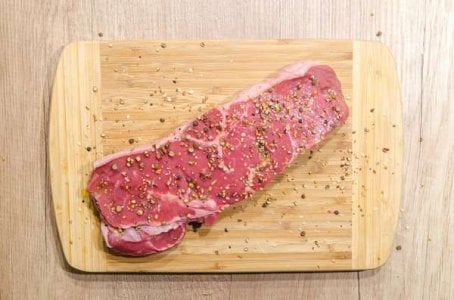The future of beef is here…and it’s nothing like you remember
By
Maan
- Replies 0
A butcher’s counter in South Australia now hides a surprising weapon against climate change.
It looks like ordinary Wagyu beef—but its secret lies in what the cattle ate before it reached the plate.
And if the idea takes off, it could change the way the world thinks about meat.
The innovation comes from CH4 Global, a company based on the Eyre Peninsula, which has been feeding cattle a diet supplemented with locally grown red seaweed.
This addition has been shown to reduce methane emissions by up to 90 per cent.
‘This technology to lower the methane emissions has been tested and proven,’ said state Trade Minister Joe Szakacs.
The so-called ‘guilt-free beef’ is already being sold at Windsor Meats in Malvern, South Australia.
It is expected to appear in local restaurants and supermarket shelves in the near future.
‘Having been that better option for people, that more sustainable option, I think it will sell itself,’ said Sam Burt from Windsor Meats.
For now, the focus is on premium Wagyu cuts.
But CH4 Global plans to expand to other varieties such as Angus—and not just the prime cuts, but also products like sausages and meatballs.
‘Starting with the Wagyu, soon to be Angus, and it won't just be the prime cuts of Angus, it'll be all the pieces, whether it's sausages or meatballs,’ said CH4 Global’s Dr Steve Meller.
The company is in talks with a national supermarket chain to make its beef available across Australia by next year.
Discussions are also underway with international chains, with the aim of supplying enough seaweed-supplemented feed for 10 million cows every day.
‘This is a South Australian innovation, a great local innovation,’ Szakacs said.
If you’re curious about other ways the meat industry is tackling methane emissions, there’s another story worth noting.
It looks at a major supermarket’s decision to trial a different feed additive aimed at reducing the environmental impact of beef.
The move sparked debate, showing that even small changes to cattle diets can stir big conversations.
Read more: Controversy over Coles' use of 'Bovaer' in beef—what to know before your next meat purchase!

Could eco-friendly beef become the new normal for meat lovers worldwide?
It looks like ordinary Wagyu beef—but its secret lies in what the cattle ate before it reached the plate.
And if the idea takes off, it could change the way the world thinks about meat.
The innovation comes from CH4 Global, a company based on the Eyre Peninsula, which has been feeding cattle a diet supplemented with locally grown red seaweed.
This addition has been shown to reduce methane emissions by up to 90 per cent.
‘This technology to lower the methane emissions has been tested and proven,’ said state Trade Minister Joe Szakacs.
The so-called ‘guilt-free beef’ is already being sold at Windsor Meats in Malvern, South Australia.
It is expected to appear in local restaurants and supermarket shelves in the near future.
‘Having been that better option for people, that more sustainable option, I think it will sell itself,’ said Sam Burt from Windsor Meats.
For now, the focus is on premium Wagyu cuts.
But CH4 Global plans to expand to other varieties such as Angus—and not just the prime cuts, but also products like sausages and meatballs.
‘Starting with the Wagyu, soon to be Angus, and it won't just be the prime cuts of Angus, it'll be all the pieces, whether it's sausages or meatballs,’ said CH4 Global’s Dr Steve Meller.
The company is in talks with a national supermarket chain to make its beef available across Australia by next year.
Discussions are also underway with international chains, with the aim of supplying enough seaweed-supplemented feed for 10 million cows every day.
‘This is a South Australian innovation, a great local innovation,’ Szakacs said.
If you’re curious about other ways the meat industry is tackling methane emissions, there’s another story worth noting.
It looks at a major supermarket’s decision to trial a different feed additive aimed at reducing the environmental impact of beef.
The move sparked debate, showing that even small changes to cattle diets can stir big conversations.
Read more: Controversy over Coles' use of 'Bovaer' in beef—what to know before your next meat purchase!
Key Takeaways
- South Australian company CH4 Global has developed beef from cattle fed with red seaweed to reduce methane emissions.
- The innovation can cut methane output by up to 90 per cent.
- Wagyu is the first product line, with Angus and other beef products to follow.
- Talks are underway to sell the beef across Australia and overseas.
Could eco-friendly beef become the new normal for meat lovers worldwide?








